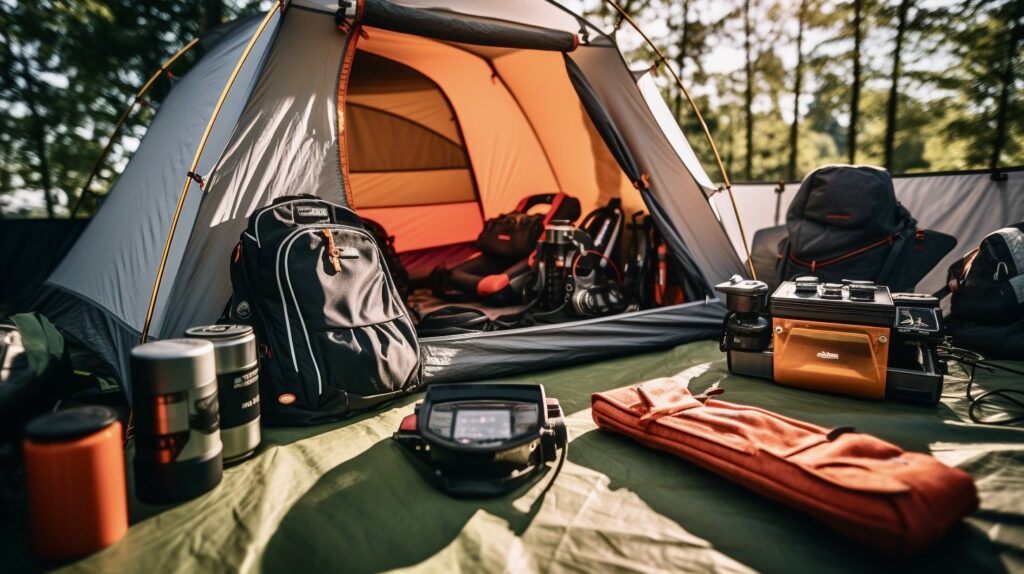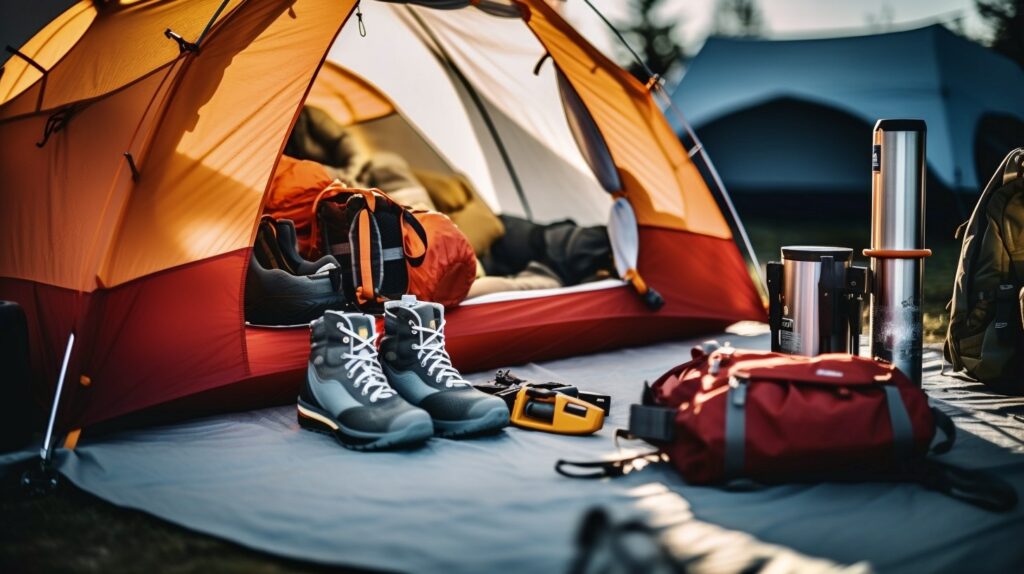Whether you’re a homebody or a nature enthusiast, camping is one adventure you should experience at least once. But before you venture into the great outdoors, there are some essentials you need to know. So, let’s break it down, step by step.
1. Build Your Gear Slowly:
Camping gear can be a never-ending rabbit hole, both in terms of functionality and cost. It’s easy to fall victim to the allure of shiny, new equipment that promises to make your camping experience better. But let us hit you with some wisdom: you don’t need to max out your credit card to kickstart your outdoor adventures.
One key to smart camping is accumulating your gear gradually. It’s a marathon, not a sprint. Fight the impulse to buy everything in one go because, believe me, you’ll save a bundle in the long run. Start with the basics – a good tent, a reliable sleeping bag, and a sturdy backpack. Invest in quality gear that’s built to last. You want stuff that can withstand the elements and won’t leave you stranded in the wilderness with a malfunctioning zipper or a torn rainfly.
2. Choose the Right Tent:
Your tent is your sanctuary in the wild, and choosing the right one is important. If you’re planning on bringing a camping buddy along for the ride, size matters. Make sure your tent can comfortably accommodate both of you, and maybe even a little extra space for gear and some wiggle room. But if you’re planning on hiking to your campsite, weight becomes a critical factor. You want a tent that’s as light as possible so that you can trek to your spot without feeling like you’re dragging an anchor on your back.
Now, let’s talk about a company that takes their tent game to the next level: Hilleberg. These guys know their stuff when it comes to tents, and they’ve got a website that’s like a treasure trove of information. Head over there, and you can explore the advantages of different tent designs. They’ve got a tent for every adventure, whether you’re chasing the sun or conquering the snow-capped peaks. Do your research, and you’ll thank yourself later when you’re cozy inside your tent, sheltered from the elements with a buddy or by yourself.
3. Ventilation Matters:
A stuffy tent can turn a night under the stars into a sweaty, claustrophobic mess. So, when you’re picking your tent, look for one with entry points on both ends. This ingenious design enhances airflow and drastically reduces condensation. Trust me; you’ll thank yourself when you’re cozied up in your sleeping bag, taking in the crisp outdoor air without feeling like you’re inside a steam room. This can also help prevent the morning sweats, when your body is super warm in the morning after bundling up after a cold night.
4. Pay Attention to Tent Poles and Fabric:
Here’s where we separate the rookies from the pros – tent poles and fabric. It’s easy to overlook these details, but trust us; they can make or break your camping experience, especially if you’re dealing with some unpredictable or extreme weather conditions.
First, let’s talk about tent poles. If you’re planning to camp in snow-prone areas or anywhere that might see a snowstorm, you need thicker tent poles. Why? Well, these polls can handle the weight of snow buildup on the roof of your tent. There’s nothing worse than waking up to a collapsed tent and a layer of snow on your face, right? So invest in quality poles that’ll keep your shelter standing tall, even in heavy snow.
Now, onto the fabric – it’s a game of permeability. The inner tent should be more permeable. Why, you might wonder? Well, that’s because you want moisture escaping from your body to leave the inner tent. Nobody likes waking up in a sauna inside their tent. On the flip side, the outer layer of the tent should be less permeable. This outer layer is your first line of defense against the outside weather. It needs to keep rain, snow, and wind out, ensuring you stay dry and cozy inside.

5. Keep It Classic:
If you’re a camping enthusiast who’s less interested in epic hikes and more into the timeless charm of the great outdoors, consider adding a dash of classic flair to your camping setup. It’s like taking a step back in time to a simpler era, all while enjoying the beauty of nature.
Vintage camping gear is where it’s at. Picture this: an old-school thermos with a cork and bakelite top. You can’t deny that it screams “retro cool” and keeps your hot beverages piping all day long. Grab yourself a classic five-gallon galvanized water cooler – it’s not just functional but adds a rustic touch to your campsite. And, for an extra dose of vintage warmth, wrap yourself in a Pendleton Wool Blanket. It’s not just about staying cozy; it’s about doing it in style (it also looks nice for Instagram). Classic camping gear not only works like a charm but also adds a unique touch to your outdoor experience.
6. Don’t Forget the Essentials:
Camping essentials – they’re called essentials for a reason. Don’t cut corners on these must-haves, or you might find yourself regretting it when you’re out in the wild.
First up, the footprint for your tent. This seemingly simple piece of gear does more than you’d think. It acts as insulation between you and the ground, ensuring that you stay cozy on chilly nights.
How about chilling by the campfire. Helinox chairs are the way to go. They’re lightweight, incredibly cool looking, and will keep your backside comfortable as you watch those marshmallows toast.
And finally, don’t skimp on the sleep system. A Western Mountaineering sleeping bag is a ticket to dreamland because they are rated for below-freezing temperatures. But here’s the pro tip: as you gain more camping experience, your preferences will evolve. You’ll want a bag that’s not just warm but also light and quick to dry between nights. It’s all part of the camping gear evolution.
7. Explore Outdoor Retailers:
Where you can score the best gear for your camping escapades? The vast world of outdoor retailers on the internet. Whether you’re looking for the latest and greatest camping gadgets or tried-and-true essentials, these websites have got you covered.
When you’re in need of top-notch gear, turn to sites like backcountry.com and moosejaw.com. These places are the wonderlands for outdoor enthusiasts. The more specific you are about your needs and the unique situations you’ll face on your camping trips, the more tailored the recommendations will be. Trust us, these websites are your own personal camping gear concierge, especially for beginners.
While exploring these digital wilderness stores, you might stumble upon nifty gadgets that you never knew you needed. Take water purification pens, for instance. They can turn a sketchy water source into a clean, hydrating oasis. Or maybe you’ll find the perfect hiking shoes that make carrying all that gear a breeze. The internet is your camping gear showroom, so take full advantage of it before you hit the trail.
8. Less Is More:
The whole point of camping is to escape the noise and chaos of our everyday lives and connect with the untouched wilderness. So, keep it simple.
You don’t need to go all Bear Grylls with a bunch of knives, axes, and gadgets. In fact, the more gear you pack, the heavier your backpack, and the harder your hike. Focus on the essentials – a solid tent, a cozy sleeping bag, and some food to keep you fueled. Remember, the less you carry, the more you can enjoy the pure, unspoiled beauty of nature.
The magic of camping lies in the simplicity of it all. You don’t need a ton of stuff; you need the right stuff. So, before you start hoarding gear, ask yourself, “Will this make my camping experience better, or is it just extra weight?” Keep it simple, and you’ll find that less really is more.
9. Bring Along Some Company:
Camping can be a blast when you’re flying solo, but there’s something magical about sharing the experience with friends or family. It adds a whole new layer of fun and camaraderie to your adventure.
When you’re planning your camping trips, reach out to your buddies and see who’s up for the challenge. There’s nothing quite like witnessing your friends having a good time in the great outdoors. It’s a unique kind of bonding that can’t be replicated in the hustle and bustle of city life.
In a nutshell, camping is about connections – connecting with nature and connecting with friends. It’s a journey best shared, and it’ll make your camping experiences richer and more memorable.
Remember, camping is all about embracing your unique circumstances, goals, and budget. Don’t waste your hard-earned cash on gear that won’t serve you well. Trust your instincts, ask specific questions, and tailor your gear to your needs. The result? Unforgettable camping adventures that are uniquely yours. Happy camping!

